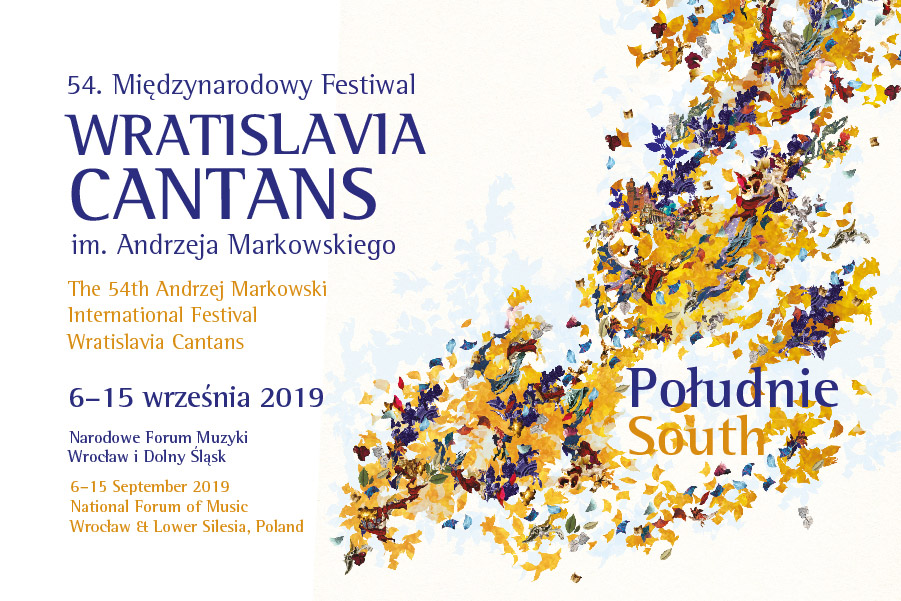Everyone has their own vision of the South. For the inhabitants of Wrocław, this idea may embody my native Italy, meanwhile, living in Milan every day, I feel more like a resident of the North and think of further regions of Italy as the south. Certainly this is the direction that attracts us, in the biographies of many artists we find noteworthy memories of the journey to the south. Goethe, when he reached Sicily, is believed to have said that he found the source of everything. We have also created a well-established myth of the South, an ideal place in which dolce vitaprevails. This year’s Wratislavia Cantans turns to the South, looks at the inspirations constantly coming from there, observes the cross-over of traditions, and looks for sources of our contemporary culture in this region.
During the festival, we will see how many different religious rites of Christianity formed in the south. The Wratislavia will be inaugurated by the vocal music of the Coptic Church originating from Egypt, and thus outside of Europe – even further to the south. Two days later we will listen to the Byzantine chorale of the Orthodox Church from the south of Europe – Greece. Marcel Pérès with Ensemble Organum and Moroccan artists will present Mozarabic singing in the Catholic Church on the Iberian Peninsula during the Moorish era – when the South somehow entered Europe. So we have a lot of vocal concerts fitting in with the tradition of Wratislavia, showing how European culture has been shaped through the meetings of various religious and ethnic groups. A concert with typically southern, African elements will be the programme presented by Giovanni Sollima, specially prepared for the Wrocław festival. Sollima, fascinated by folklore, and especially by the rhythm in ethnic music, will in his concert alternate works by composers associated with Naples, and thus the south of Italy, with indigenous music from Africa.
Naturally, the question arises about the music from the other extreme, from the North – the answer is the Fairytalesprogramme also referring to folk culture manifesting itself in fairy tales: we will listen mainly to Dutch and Scandinavian works. I am very interested in a programme with Polish folklore (Songs from the Forests and Fields). Folk music around the world had a major impact on the development of classical art in the nineteenth century, and today we observe a return to ‘music of our ancestors’ which may be related to our own time of redefining the identity of Europeans.
The South at the festival is of course also present in concerts with Italian music. With Il Giardino Armonico and soloists, I will present the Antonio Vivaldi’s Juditha triumphans previously performed on Wratislavia in the 1970s that is several decades ago. The form of the work best suits the festival devoted especially to oratorio and cantata music, and Vivaldi’s very valuable sacred music still needs propagation. We will hear two generations of the Scarlattis, a family connected with the city of Naples, which was in the eighteenth century the centre of avant-garde in music. Odhecaton of Paolo da Col will perform with the accompaniment of basso continuo the recently discovered and still lesser-known sacred works of Alessandro Scarlatti, their quality being comparable to Bach’s compositions. Domenico, son of Alessandro, is associated with keyboard music present in the repertoire of the majority of great pianists. During Wratislavia, we will get acquainted with Tolomeo e Alessandro opera rediscovered in the 21st century. One of the best Italian ensembles, Mala Punica, specialising in medieval music under the direction of Pedro Memelsdorff, will present works from historical manuscripts: anonymous works and pieces by Johannes Ciconia, a Flemish composer, who moved to Italy to develop his career – many other artists did the same later. Mikołaj Zieleński was a composer who found inspiration in novelties appearing in Italian art, among others polychoral music. His work is an example of the continuous flow of ideas between the south and the north of Europe and the openness of Poland to inspiring influences from outside. This year’s Wratislavia shows how elements of different cultures or religious rituals have mixed in music.
Already on the second day of the festival, we will hear a spectacular work involving vast performance forces – Gustav Mahler’s Symphony No. 3. The concert will be a tribute to the great conductor Zubin Mehta, who will be standing on the conductor’s podium in Wrocław a month before his planned retirement – it will be one of his last concerts as Music Director of the Israel Philharmonic Orchestra. The musicians will perform together with the NFM Boys’ Choir and NFM Choir – the collaboration of guest artists with Wrocław artists has been an important part of Wratislavia Cantans for many years. The festival will end with one of the greatest operas of the 20th century, Porgy and Bessby George Gershwin, a work that arouses controversy and is certainly still very important, combining the classical form with jazz, spirituals and folklore. The first Afro-American opera tackles the subject of the influence of the South – the African continent – on today’s North America. I am happy that Wayne Marshall, principal conductor of the WDR Funkhausorchester Köln, a specialist in jazz and American music, will be at the festival. He is the author of the concert version of this opera, prepared in consultation with the Gershwin Foundation.
Giovanni Antonini

